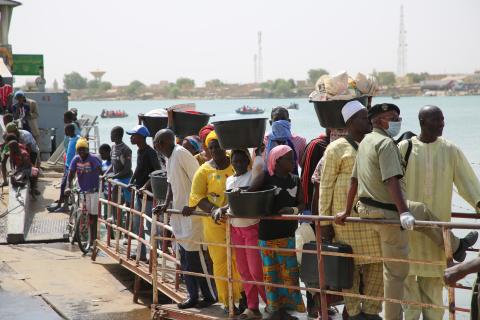Border Security Report2020-04-03 13:30:49
Holding the Line: Border Officials Mobilize Against COVID-19 With IOM’s Support
The daily trickle of travelers, livestock and goods that once boarded the ferry between Mauritania and Senegal through the Rosso border crossing will grow when it reopens, one of the few active points of entry (POEs) between the two countries.
“In normal circumstances we saw about 100 crossings a day, mainly Mauritanians and Senegalese joining their families or going to work,” one border officer said.
“But, with the travel restrictions in response to COVID-19, and fewer crossings available, between 200 and 350 people were crossing here every day before it was closed. People wanted to go home or leave Senegal, which has recorded cases of COVID-19.”
The impact of the pandemic is being felt in communities from the banks of the Senegal River in this vast desert nation in northwest Africa, to the border country in Southeast Asia. Here, and in a dozen other points around the globe, IOM is applying decades of experience in border management and migration health to empower local authorities, residents and migrants to address and mitigate the spread of the virus and prepare for the future.
“IOM’s activities in Mauritania are part of a larger global effort to provide advice and concrete support to immigration and border authorities and partners coping with current extraordinary situation,” said Florian Forster, the Head of IOM’s Immigration and Border Management Division in the Geneva.
“The virus is having an enormous impact on safe, orderly and regular migration and cross-border mobility. Migrants and mobile populations are heavily affected and can find themselves in particular vulnerable situations. And, immigration officials themselves are severely affected and in need of concrete support and informed advice.”
- IOM is helping health authorities in Senegal assess the health of travelers by providing equipment, training to border agents and community engagement activities along its borders with Mali, Guinea and The Gambia. Practical educational tools have been produced.
- In Kenya, IOM has supported the preparedness and response efforts of the government by providing infection prevention and control supplies for frontline immigration officers at critical points of entry, including airports.
- In the world’s newest nation, South Sudan, IOM procured hand-held thermal scanners and is screening passengers at airports and airstrips.
- In Jordan, IOM completed a COVID-19 needs assessment at the county’s land, sea and air border crossing points with the Ministry of Health and in coordination with the WHO.
- In Herat, western Afghanistan, IOM has mobilized health teams to support POE screening processes, with a focus on the tens of thousands of migrants returning from Iran which has seen more than 41,500 cases. Similar efforts are underway in Rwanda, where the Organization is building on existing, successful Ebola virus disease interventions.
- In Thailand, where IOM reports there are up to five million migrant workers, factory closures have caused tens of thousands of people try and return home to neighbouring Myanmar, Cambodia and Laos. IOM is monitoring border movements in the region and providing assistance to the migrants and governments, despite limited resources.
Like their counterparts around the world, Mauritanian authorities have taken preventive measures to check the spread of the coronavirus, closing all schools, cafés and restaurants, banning non-essential gatherings, and closing air borders.
Today, only eight of the country’s 45 border crossings, remain active to transport goods and food.
Were it open, travelers trying to cross in Rosso would face long waits to receive authorization to enter and crowded lines where they would be unable to apply the “social distancing” measures advised by the WHO.
Police and customs officers had little or no protection, there was a lack of screening equipment and basic hygiene rules were not always applied. In response, IOM is providing training and donating medical and protective equipment in partnership with the WHO to strengthen the government’s management of the virus.
“The closure of border posts has a heavy impact on the border communities’ economic activities,” said Laurent de Castelli, head of the Border Management unit at IOM Mauritania. “This training will allow the authorities to reopen the border posts quickly, as well as prevent and detect possible COVID-19 cases.”
When the border crossings resume, newly trained police will be able to check the passengers’ temperature as they come off the ferry and have them wash their hands.
“I am satisfied with the cooperative spirit shown by the inhabitants to prevent this disease from entering the country,” said Abdel Kader Ould Tiyib, Hakem (Prefect) of Rosso. “They are following to the letter all the instructions issued by the authorities.”
With the recent closure of the main POE at Mauritania’s northern border with Morocco, the numbers of stranded migrants in Mauritania—or Mauritanians in Morocco and Senegal—are likely to increase. Other Mauritanian border crossing points have the same needs as Rosso for support and training.
The border communities exposed to the disorderly movements and poorly sensitised on this disease are today most vulnerable to the COVID-19 outbreak. IOM will work over the next few days to raise awareness and better protect these communities in collaboration with the government.
These training sessions and donations were made possible thanks to the support of the European Union Trust Fund for Africa through the EU-IOM Joint Initiative for Migrant Protection and Reintegration.
